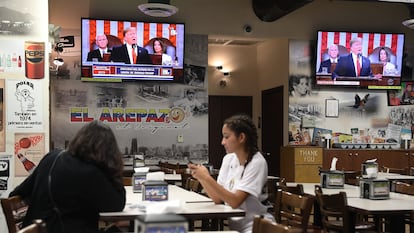US extends protected status to Venezuelan migrants
Under Temporary Protected Status, nationals from the South American country will be safe from deportation and will have the possibility of obtaining work permits


One of the first decisions that US President Joe Biden made after arriving at the White House was to include Venezuelan migrants under the government’s Temporary Protected Status (TPS), a designation that is now being extended for another 18 months. “After careful consideration, and in consultation with the secretary of state, today I am extending that designation,” said Secretary of Homeland Security Alejandro N. Mayorkas in a statement Monday.
This measure is used by the US government to provide shelter to citizens of countries experiencing environmental disasters or armed conflicts. For the hundreds of thousands of Venezuelan migrants that the prolonged humanitarian crisis in the South American country has produced, the move comes as a relief as it protects them from deportation and grants the possibility of obtaining work permits.
The statement noted that the 18-month extension of TPS for Venezuela will be effective from September 10, 2022, through March 10, 2024. “Only beneficiaries under Venezuela’s existing designation, and who were already residing in the United States as of March 8, 2021, are eligible to re-register for TPS under this extension. Venezuelans who arrived in the United States after March 8, 2021, are not eligible for TPS.” It is estimated that 200,000 could be left without protection.
The Biden administration estimates that 343,000 Venezuelans are eligible under the existing TPS designation, but applications may exceed that number. Senator Bob Menéndez reported that until early May some 76,000 TPS for Venezuelans had been approved. These citizens also head asylum applications. Menéndez and other senators recently asked the government to extend TPS in Venezuela and thus allow “thousands of immigrants from that South American country to continue to be protected from deportation and have permission to work legally in the United States.”
In a letter released by US media, the senators pointed out that since TPS designation was granted to Venezuelans more than a year ago, threats to civilians by armed actors, the erosion of the rule of law and the systemic collapse of vital infrastructure have forced almost half a million additional people to flee the country, bringing the total number of Venezuelan refugees to more than six million.
In 2021, Venezuelan arrivals in the US increased, especially through the border with Mexico. More than 100,000 crossed in 2021, compared to 5,000 who did so in 2020, according to data from the interim government of opposition leader Juan Guaidó, who is still recognized by Washington, and who has celebrated the extension of TPS. There are more than six million people who have left Venezuela in the last five years, representing one of the largest migratory movements on the planet.
Despite the fact that the extension of TPS designation implies a recognition of the adverse conditions that are still being experienced in Venezuela, the United States has recently eased tensions with Venezuelan leader Nicolás Maduro and is lobbying for the opposition and the Chavista government to resume negotiations in Mexico. After a historic visit to Caracas by Washington officials last March, the United States authorized Chevron, Eni and Repsol to exploit their gas and oil deposits in Venezuela for export. Washington also removed Carlos Malpica Flores, a senior official linked to corruption cases and nephew of the Venezuelan first lady Cilia Flores, from the OFAC (Office of Foreign Assets Control) list.
Tu suscripción se está usando en otro dispositivo
¿Quieres añadir otro usuario a tu suscripción?
Si continúas leyendo en este dispositivo, no se podrá leer en el otro.
FlechaTu suscripción se está usando en otro dispositivo y solo puedes acceder a EL PAÍS desde un dispositivo a la vez.
Si quieres compartir tu cuenta, cambia tu suscripción a la modalidad Premium, así podrás añadir otro usuario. Cada uno accederá con su propia cuenta de email, lo que os permitirá personalizar vuestra experiencia en EL PAÍS.
¿Tienes una suscripción de empresa? Accede aquí para contratar más cuentas.
En el caso de no saber quién está usando tu cuenta, te recomendamos cambiar tu contraseña aquí.
Si decides continuar compartiendo tu cuenta, este mensaje se mostrará en tu dispositivo y en el de la otra persona que está usando tu cuenta de forma indefinida, afectando a tu experiencia de lectura. Puedes consultar aquí los términos y condiciones de la suscripción digital.








































